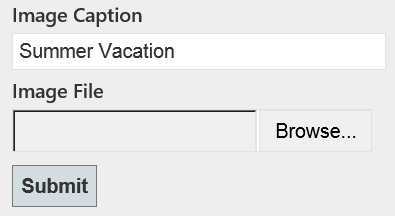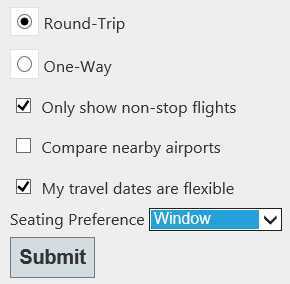标签:des blog http io ar os 使用 sp for
本文引自:http://www.cnblogs.com/r01cn/archive/2012/12/20/2826230.html
By Mike Wasson|June 21, 2012
作者:Mike Wasson | 日期:2012-6-21
This tutorial shows how to upload files to a web API. It also describes how to process multipart MIME data.
本教程演示如何对Web API上传文件。也描述如何处理多部分MIME数据。
Here is an example of an HTML form for uploading a file:
以下是一个上传文件的HTML表单(如图5-8):
<form name="form1" method="post" enctype="multipart/form-data" action="api/upload">
<div>
<label for="caption">Image Caption</label>
<input name="caption" type="text" />
</div>
<div>
<label for="image1">Image File</label>
<input name="image1" type="file" />
</div>
<div>
<input type="submit" value="Submit" />
</div>
</form>

图5-8. 文件上传表单
This form contains a text input control and a file input control. When a form contains a file input control, the enctype attribute should always be "multipart/form-data", which specifies that the form will be sent as a multipart MIME message.
该表单有一个文本输入控件和一个文件输入控件。当表单含有文件输入控件时,其enctype标签属性应当总是“multipart/form-data”,它指示此表单将作为多部分MIME消息进行发送。
The format of a multipart MIME message is easiest to understand by looking at an example request:
通过考察一个示例请求,很容易理解multipart(多部分)MIME消息的格式:
POST http://localhost:50460/api/values/1 HTTP/1.1 User-Agent: Mozilla/5.0 (Windows NT 6.1; WOW64; rv:12.0) Gecko/20100101 Firefox/12.0 Accept: text/html,application/xhtml+xml,application/xml;q=0.9,*/*;q=0.8 Accept-Language: en-us,en;q=0.5 Accept-Encoding: gzip, deflate Content-Type: multipart/form-data; boundary=---------------------------41184676334 Content-Length: 29278
-----------------------------41184676334 Content-Disposition: form-data; name="caption"
Summer vacation -----------------------------41184676334 Content-Disposition: form-data; name="image1"; filename="GrandCanyon.jpg" Content-Type: image/jpeg
(Binary data not shown)(二进制数据,未列出) -----------------------------41184676334--
This message is divided into two parts, one for each form control. Part boundaries are indicated by the lines that start with dashes.
这条消息分成两个部件(parts),分别用于每个表单控件。部件边界由以一些破折号开始的行指示。
The part boundary includes a random component ("41184676334") to ensure that the boundary string does not accidentally appear inside a message part.
部件边界包含了一个随机组件(“41184676334”),以确保边界字符串不会偶然出现在消息部件之中。
Each message part contains one or more headers, followed by the part contents.
每一个消息部件含有一个或多个报头,后跟部件内容。
In the previous example, the user uploaded a file named GrandCanyon.jpg, with content type image/jpeg; and the value of the text input was "Summer Vacation".
在上一示例中,用户上传名为GrandCanyon.jpg的文件,其内容类型为image/jpeg,而文本输入框的值为“Summer Vacation”。
Now let‘s look at a Web API controller that reads files from a multipart MIME message. The controller will read the files asynchronously. Web API supports asynchronous actions using the task-based programming model. First, here is the code if you are targeting .NET Framework 4.5, which supports the async and await keywords.
现在,让我们考查从一个多部分MIME消息读取文件的控制器。该控制器将异步读取文件。Web API支持使用“基于任务的编程模型(这是关于.NET并行编程的MSDN文档 — 译者注)”的异步动作。首先,以下是针对.NET Framework 4.5的代码,它支持async和await关键字。
using System.Diagnostics; using System.Net; using System.Net.Http; using System.Threading.Tasks; using System.Web; using System.Web.Http;
public class UploadController : ApiController { public async Task<HttpResponseMessage> PostFormData() { // Check if the request contains multipart/form-data. // 检查该请求是否含有multipart/form-data if (!Request.Content.IsMimeMultipartContent()) { throw new HttpResponseException(HttpStatusCode.UnsupportedMediaType); }
string root = HttpContext.Current.Server.MapPath("~/App_Data"); var provider = new MultipartFormDataStreamProvider(root);
try { // Read the form data. // 读取表单数据 await Request.Content.ReadAsMultipartAsync(provider);
// This illustrates how to get the file names. // 以下描述如何获取文件名 foreach (MultipartFileData file in provider.FileData) { Trace.WriteLine(file.Headers.ContentDisposition.FileName); Trace.WriteLine("Server file path: " + file.LocalFileName); } return Request.CreateResponse(HttpStatusCode.OK); } catch (System.Exception e) { return Request.CreateErrorResponse(HttpStatusCode.InternalServerError, e); } } }
Notice that the controller action does not take any parameters. That‘s because we process the request body inside the action, without invoking a media-type formatter.
注意,控制器动作不取任何参数。这是因为我们是在动作中处理请求体的,不必调用media-type格式化器。
The IsMultipartContent method checks whether the request contains a multipart MIME message. If not, the controller returns HTTP status code 415 (Unsupported Media Type).
IsMultipartContent方法检查该请求是否含有多部分MIME消息。如果不是,控制器返回HTTP状态码415(不支持的媒体类型)。
The MultipartFormDataStreamProvider class is a helper object that allocates file streams for uploaded files. To read the multipart MIME message, call the ReadAsMultipartAsync method. This method extracts all of the message parts and writes them into the streams provided by the MultipartFormDataStreamProvider.
MultipartFormDataStreamProvider类是一个辅助器对象,它为上传文件分配文件流。为了读取多部分MIME消息,需调用ReadAsMultipartAsync方法。该方法提取所有消息部件,并把它们写入由MultipartFormDataStreamProvider提供的流中。
When the method completes, you can get information about the files from the FileData property, which is a collection of MultipartFileDataobjects.
当该方法完成时,你可以通过FileData属性获得文件的信息,该属性是一个MultipartFileData对象的集合。
As the name suggests, ReadAsMultipartAsync is an asynchronous method. To perform work after the method completes, use a continuation task (.NET 4.0) or the await keyword (.NET 4.5).
正如名称所暗示的那样,ReadAsMultipartAsync是一个异步方法。为了在该方法完成之后执行一些工作,需要使用“continuation(继续)任务”(.NET 4.0)或await关键字(.NET 4.5)。
Here is the .NET Framework 4.0 version of the previous code:
以下是前述代码的.NET Framework 4.0版本:
public Task<HttpResponseMessage> PostFormData()
{
// Check if the request contains multipart/form-data.
// 检查该请求是否含有multipart/form-data
if (!Request.Content.IsMimeMultipartContent())
{
throw new HttpResponseException(HttpStatusCode.UnsupportedMediaType);
}
string root = HttpContext.Current.Server.MapPath("~/App_Data");
var provider = new MultipartFormDataStreamProvider(root);
// Read the form data and return an async task.
// 读取表单数据,并返回一个async任务
var task = Request.Content.ReadAsMultipartAsync(provider).
ContinueWith<HttpResponseMessage>(t =>
{
if (t.IsFaulted || t.IsCanceled)
{
Request.CreateErrorResponse(HttpStatusCode.InternalServerError, t.Exception);
}
// This illustrates how to get the file names.
// 以下描述了如何获取文件名
foreach (MultipartFileData file in provider.FileData)
{
Trace.WriteLine(file.Headers.ContentDisposition.FileName);
Trace.WriteLine("Server file path: " + file.LocalFileName);
}
return Request.CreateResponse(HttpStatusCode.OK);
});
return task;
}
The HTML form that I showed earlier had a text input control.
前面显示的HTML表单有一个文本输入控件。
<div>
<label for="caption">Image Caption</label>
<input name="caption" type="text" />
</div>
You can get the value of the control from the FormData property of the MultipartFormDataStreamProvider.
可以通过MultipartFormDataStreamProvider的FormData属性获取控件的值。
public async Task<HttpResponseMessage> PostFormData()
{
if (!Request.Content.IsMimeMultipartContent())
{
throw new HttpResponseException(HttpStatusCode.UnsupportedMediaType);
}
string root = HttpContext.Current.Server.MapPath("~/App_Data");
var provider = new MultipartFormDataStreamProvider(root);
try
{
await Request.Content.ReadAsMultipartAsync(provider);
// Show all the key-value pairs.
// 显示所有“键-值”对
foreach (var key in provider.FormData.AllKeys)
{
foreach (var val in provider.FormData.GetValues(key))
{
Trace.WriteLine(string.Format("{0}: {1}", key, val));
}
}
return Request.CreateResponse(HttpStatusCode.OK);
}
catch (System.Exception e)
{
return Request.CreateErrorResponse(HttpStatusCode.InternalServerError, e);
}
}
FormData is a NameValueCollection that contains name/value pairs for the form controls. The collection can contain duplicate keys. Consider this form:
FormData是一个NameValueCollection(名字/值集合),它含有表单控件的“名字/值”对。该集合可能含有重复键。考虑以下表单(如图5-9):
<form name="trip_search" method="post" enctype="multipart/form-data" action="api/upload">
<div>
<input type="radio" name="trip" value="round-trip"/>
Round-Trip
</div>
<div>
<input type="radio" name="trip" value="one-way"/>
One-Way
</div>
<div>
<input type="checkbox" name="options" value="nonstop" />
Only show non-stop flights
</div>
<div>
<input type="checkbox" name="options" value="airports" />
Compare nearby airports
</div>
<div>
<input type="checkbox" name="options" value="dates" />
My travel dates are flexible
</div>
<div>
<label for="seat">Seating Preference</label>
<select name="seat">
<option value="aisle">Aisle</option>
<option value="window">Window</option>
<option value="center">Center</option>
<option value="none">No Preference</option>
</select>
</div>
</form>

图5-9. 有重复键的表单
The request body might look like this:
该请求体看上去可能像这样:
-----------------------------7dc1d13623304d6 Content-Disposition: form-data; name="trip"
round-trip -----------------------------7dc1d13623304d6 Content-Disposition: form-data; name="options"
nonstop -----------------------------7dc1d13623304d6 Content-Disposition: form-data; name="options"
dates -----------------------------7dc1d13623304d6 Content-Disposition: form-data; name="seat"
window -----------------------------7dc1d13623304d6--
In that case, the FormData collection would contain the following key/value pairs:
在这种情况下,FormData集合会含有以下“键/值”对:
(转)WebApi发送HTML表单数据:文件上传与多部分MIME
标签:des blog http io ar os 使用 sp for
原文地址:http://www.cnblogs.com/wpcnblog/p/4092883.html